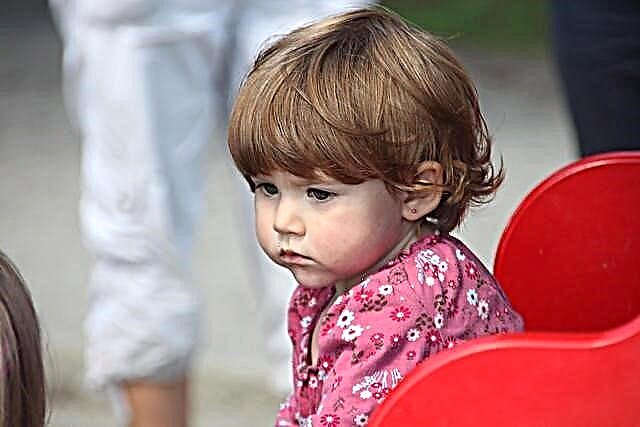Newborn screening is designed to detect dangerous hereditary diseases and developmental disabilities. With timely and proper treatment, infants have a chance to get rid of terrible diagnoses without serious clinical consequences. During the examination, childhood diseases can be identified, which are easier to cope with at an early stage.

Newborn
What is screening
Screening is a set of measures aimed at searching for possible diseases in the absence of signs indicating them. The most dangerous deviations are determined, the early detection of which will allow taking measures and smoothing out the consequences. The first screening is carried out for the mother during pregnancy, it allows diagnosing fetal defects. Then the study is carried out already in the baby after his birth.
Why screening is done
Screening is a study that allows you to timely detect pathologies in an infant associated with genetic abnormalities. Thanks to him, many diseases can be diagnosed even before the first symptoms appear. This allows you to prescribe treatment and minimize negative consequences.
Identification of genetic diseases
Screening for newborns is usually done in the hospital. Blood is taken from the baby's heel not earlier than on the fourth day after birth. The analysis allows you to assess whether the child has dangerous genetic diseases. Typically, the study covers five of them, which are the most common. The challenge is to start treatment as soon as possible in order to prevent complications, avoid disability and make life full and comfortable.
Note! At risk are children whose relatives, even distant ones, suffered from genetic diseases. Even in a healthy family, the baby may have deviations. Therefore, you should not ignore the survey.
With the help of heel screening of newborns, the possibility of development is determined:
- Cystic fibrosis. The endocrine glands, which include the adrenal glands, pituitary gland, thyroid gland, are affected. The work of the digestive and respiratory organs is disrupted, the liver suffers. The disease can be diagnosed even without a test, if there is an obstruction of meconium, original feces. This symptom is observed in a third of patients. The disease is treatable, early detection of cystic fibrosis contributes to this;
- Hypotheriosis. At the same time, the thyroid gland does not produce enough hormones necessary for full growth and development. The metabolism slows down. This is mainly due to a lack of iodine produced by thyroxine, a hormone synthesized by the gland in a small volume. With the help of drug therapy, you can make up for its deficiency by regulating metabolic processes;
- Androgenital syndrome. The disease occurs due to dysfunction of the adrenal cortex. The level of cortisol, which is involved in carbohydrate metabolism, decreases. At the same time, the levels of other steroid hormones rise. Due to the imbalance, women develop traits characteristic of men. In addition, the syndrome can lead to diseases of the heart and blood vessels. It is impossible to cure it completely, only to correct the course, relying on hormonal therapy;
- Phenylketonuria. The disease is successfully treated, and timely diagnosis helps. With it, the metabolism of amino acids is disrupted. Excessive accumulation of phenylanine has a toxic effect on the body, primarily affecting the central nervous system. As a result, mental retardation is observed;
- Galactosemia. Enzyme deficiency occurs, causing problems with the breakdown of one of the sugars - galactose. The disease affects the liver, its onset is accompanied by yellowing of the skin, nausea, vomiting. It can affect physical and mental development.
Deafness detection
Hearing screening is usually done in a maternity hospital. It is important to identify deafness as early as possible. The inability to hear what is happening around is reflected in the development of the child, his mental abilities and speech skills.
Note! Even if the baby is not completely deaf, he cannot catch some sounds, perceive prepositions. It is much more difficult for him to master speech.
It is important to test newborns' hearing to avoid future problems.

Deafness diagnostics
Identification of pathologies
Pathologies are identified on the basis of examination of the newborn and analyzes. Immediately after birth, the baby's condition is assessed using the Apgar scale and basic reflexes are checked. Later, when the baby slightly adapts to the world and gets to know his mother, a more thorough examination is carried out. Doctors investigate:
- skin;
- abdomen, evaluating the liver and spleen;
- head, determining the size of fontanelles, and whether there is damage to the bones of the skull;
- neck to make sure the collarbone is intact.
Also, the neonatologist checks the muscle tone by bending and unbending the child's legs and arms, looks to see if the folds on the buttocks match.

Examination of the newborn
A month later, the baby is sent for an ultrasound scan. If necessary, research is carried out earlier.
Types of newborn screening
Newborn screening is a massive study that affects all children. At the request of the parents, they can conduct additional tests on a paid basis.
Neonatal
Neonatal screening allows early detection of congenital diseases, often leading to disability. To avoid dire consequences, treatment should be started as early as possible. The complete list of genetic abnormalities contains more than 500 items. The diseases selected for screening are the most common diseases in the modern world and can significantly affect the quality of life. Diagnostic methods are simple and safe for the child. No threat to his life and health will arise after the blood sampling procedure.
In addition, diagnosed diseases are treated, or there are drugs that help maintain health so that the child will feel comfortable and develop fully.
Audiological
With audiological screening, you can:
- Determine hearing impairment and the presence of hearing loss;
- Apply hearing aids. If the child is diagnosed with hearing loss, electrodes are prescribed;
- Conduct therapeutic measures for observed deviations;
- Start working with an audiologist, which is recommended from the very first years of life, in order to improve the child's adaptation. Classes are necessary not only for the baby, but also for the parents.
Note! If a newborn has hearing problems, then action must be taken immediately. It has been proven that the most effective treatment is carried out in the first six months of a baby's life.
Ultrasound
Ultrasound of newborns includes several studies. During the procedure, the specialist examines:
- Brain. The procedure can be done while the fontanelle is not overgrown. Then the ultrasound waves cannot be used for diagnosis. The state of the brain, its parts, ventricles, their size and functioning are assessed. Also, the procedure allows you to determine the presence of hematomas, cysts and other formations, to study the work of blood vessels;
- Hip joints. The study is necessary for the early diagnosis of dysplasia. Dislocation of the hip or hip joint occurs with the disease. The earlier the deviation is treated, the less consequences it will bring. In addition, the lack of rehabilitation procedures at an early age can lead to complications in adulthood;
- Heart. As a result of the examination, the structural features of the organ, blood flow velocity, and pressure are assessed. The procedure is especially necessary for children with a diagnosed defect in order to monitor changes in dynamics, and babies who have a heart murmur at a pediatrician appointment;
- Abdominal cavity and kidneys. The doctor examines the liver, spleen, pancreas, gallbladder. The size of the organs, the state of the mucous membrane are evaluated.
An ultrasound scan is a painless procedure that does not take long.

Ultrasound
Newborn Screening Scheme
Screening a newborn - a test for the presence of deviations or pathologies in development. The sooner they are discovered, the more ways to avoid complications.
Analyzes
When taking blood from the baby's heel, the place is treated with alcohol and a small puncture is made. Parents are informed about the procedure in advance, it should be carried out on an empty stomach, at least two hours after feeding the crumbs must be sustained. The first drop of blood is erased from the leg, and then a special form is blotted. It contains the data of the child and mother. After the leaf is dry, it is sent to the laboratory.
Note! If no genetic diseases are detected, and all indicators are normal, the results are not sent to the maternity hospital or clinic.
Tests
An audiological test is performed when the child is three days old. A signal is sent to the ear using a special device. The device evaluates the response received and determines if the newborn has a problem or is normal hearing.
Screening timing
A baby is screened almost immediately after birth, in the first month of life. Most of the procedures are planned for the time when the baby is still in the hospital.
It is recommended to take blood from the heel after three days of the child's stay in the hospital. If the baby was born prematurely, the analysis is transferred and carried out in a week.

Blood sampling
When the result is announced
Calcaneal screening results are usually available in 10-15 days. Parents will only be contacted if problems arise. This happens when the result is positive or can be questioned. In any case, they are first sent for re-analysis, if it remains unchanged, additional examinations are prescribed in order to obtain the necessary treatment.
The result of the audiological screening is announced immediately. After the procedure, parents will learn about the need for consultation with a specialist and further examination. If the newborn's verdict “did not pass,” he is sent again for hearing screening in a month, but this time at the district clinic. In the event of a repetition of such a result, the child needs to visit the audiological center to prescribe treatment procedures and determine the direction of action.
After the ultrasound, the picture is also immediately clear, whether the baby has pathology or not is visible on the screen. If problems are noticed, then a visit to a narrow specialist, for example, a neurologist, gastroenterologist, orthopedist, will be required.
Newborn screening is an examination that the World Health Organization recommends is mandatory. It will not harm the child, all procedures are safe, this also applies to taking biomaterials and testing hearing. Ultrasound examination also has no effect on the growth and development of the baby. Whatever the diagnosis, it is easier to get rid of it up to a year. The main thing is timely diagnosis.



